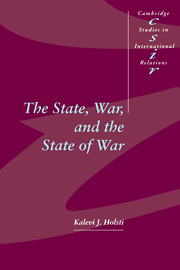Book contents
- Frontmatter
- Contents
- Preface
- 1 Thinking about war in international politics
- 2 Wars of the third kind
- 3 The formation of states before 1945
- 4 The creation of states since 1945
- 5 The strength of states
- 6 The perils of the weak: the state-strength dilemma
- 7 Wars of the third kind and international politics
- 8 Analyzing an anomaly: war, peace, and the state in South America
- 9 International responses to the weak state: managing and resolving wars of the third kind
- Appendix: Major armed conflicts by region and type, 1945–1995
- References
- Index
- CAMBRIDGE STUDIES IN INTERNATIONAL RELATIONS
4 - The creation of states since 1945
Published online by Cambridge University Press: 05 May 2010
- Frontmatter
- Contents
- Preface
- 1 Thinking about war in international politics
- 2 Wars of the third kind
- 3 The formation of states before 1945
- 4 The creation of states since 1945
- 5 The strength of states
- 6 The perils of the weak: the state-strength dilemma
- 7 Wars of the third kind and international politics
- 8 Analyzing an anomaly: war, peace, and the state in South America
- 9 International responses to the weak state: managing and resolving wars of the third kind
- Appendix: Major armed conflicts by region and type, 1945–1995
- References
- Index
- CAMBRIDGE STUDIES IN INTERNATIONAL RELATIONS
Summary
State-creation in the former colonial areas, and to a different degree in some of the former Soviet republics since 1991, has taken patterns and trajectories significantly different from those of Europe since the fifteenth century. In the latter, there was a lengthy historical project to give political meaning to the geographical expressions called France, Germany, Sweden, and the like. The consequence of wars, centralization, taxes, and the provision of services was to create a form of political organization called the state.
The original purposes of colonialism, in contrast, never included state-making. European overseas conquests after the fifteenth century had nothing in common with the state-consolidation projects of Louis XIV, Peter the Great, Frederick the Great, or Bismarck. Imperialism was driven by a variety of purposes: trade, slavery, exploitation of resources, “civilizing” the barbarians, religious conversion to Christianity, ending the Arab slave trade (late nineteenth century), securing strategic territories, and emulation: if the British were expanding in Africa, the Germans had to do the same in order to maintain their status as a great power. Colonialism was as much a product of European external rivalries as of domestic imperatives. Conspicuously absent from this non-exhaustive list of the purposes of colonialism is any state-making project. Whether the colonialism of the fifteenth through eighteenth centuries, or its late nineteenth-century counterpart, the colonial leaders, encompassing the military, government officials, colonial societies, political parties, and the churches, never assumed that some day the subjugated peoples should or could create a state form of political organization.
- Type
- Chapter
- Information
- The State, War, and the State of War , pp. 61 - 81Publisher: Cambridge University PressPrint publication year: 1996



